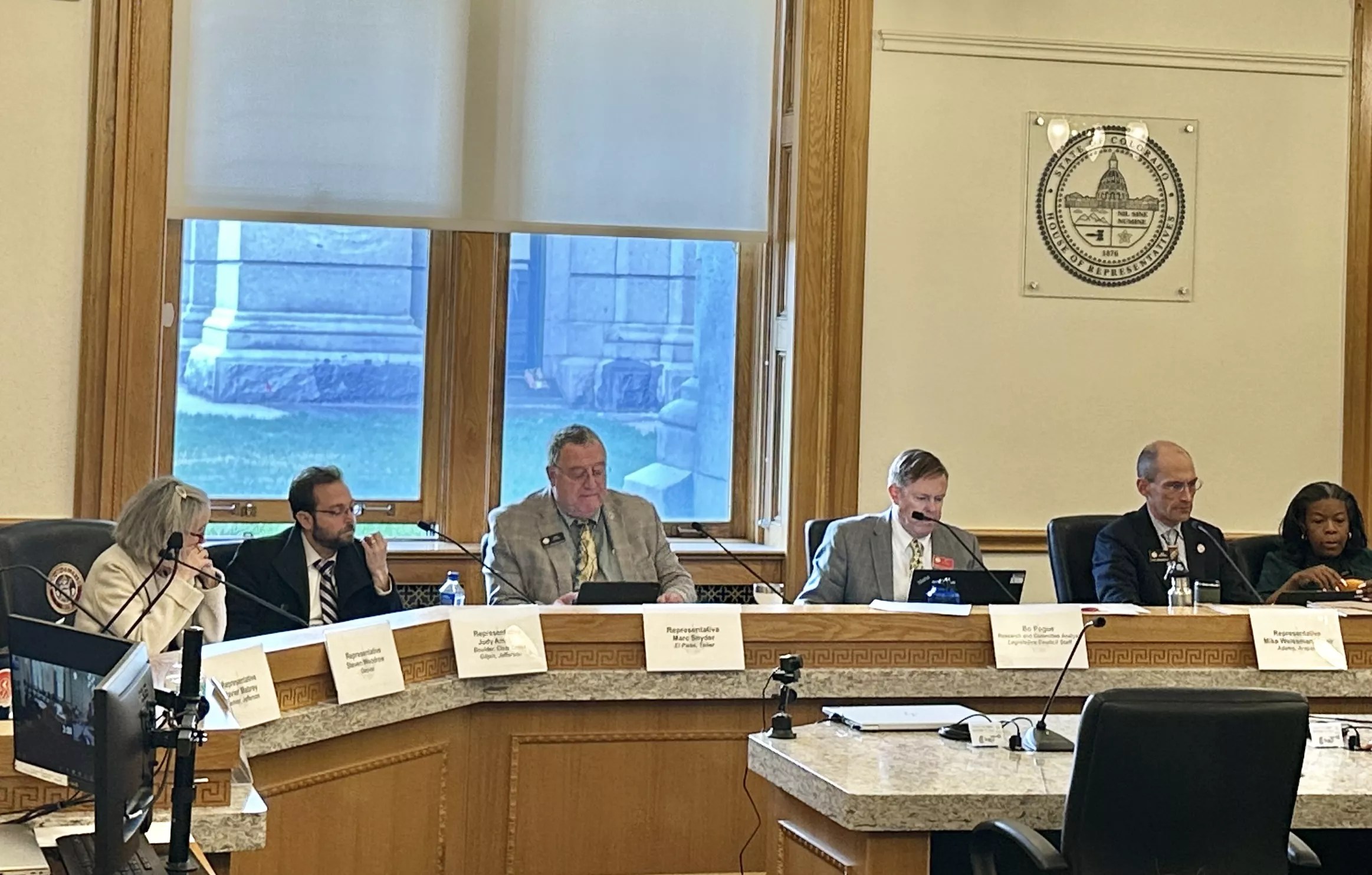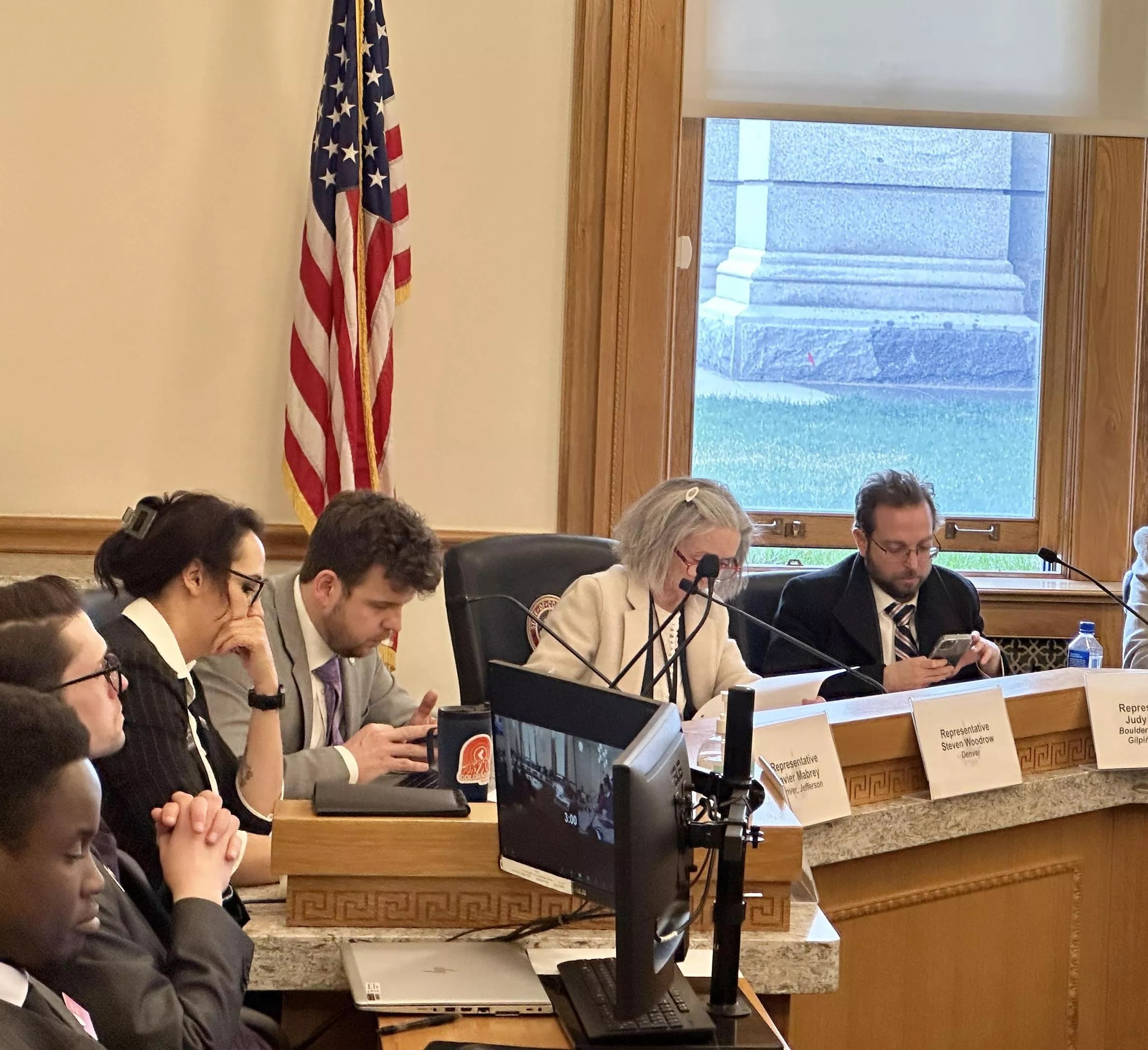
Westword

Audio By Carbonatix
A bill to reduce Colorado’s mental competency waiting list passed out of the House Judiciary committee unanimously last week; it aims to divert eligible defendants with serious mental health and neurocognitive conditions to “wraparound, community-based services” instead of keeping them in custody.
However, concerns linger regarding funding, required community resources and other “substantial issues” raised by district attorneys, even ones who support the bill.
“Funding is a legitimate issue,” says Denver District Attorney Beth McCann, who provided testimony on March 26 in support of House Bill 24-1355, which is sponsored by state representatives Javier Mabrey and Judy Amabile.
The legislation would require judicial districts to develop a process to identify and refer individuals charged with “low-level offenses” to a wraparound program run by Bridges of Colorado, a court liaison group and independent state office established by the Colorado Legislature last April.
Roughly 400 people are currently locked up in county and city jails waiting to be transported to the Colorado Mental Health Hospital in Pueblo or Fort Logan in Denver. The backlog has been blamed on staffing and bed shortages, increases in competency evaluations and a lack of funding; it has gotten so bad over the years that a federal court issued a consent decree in 2019 to create a fine that Colorado must now pay when the state fails to meet competency waitlist standards. Taxpayers have been coughing up between $10 million and $12 million a year ever since.
The Bridges Wraparound Care program would serve as a “community-based alternative” to competency proceedings, according to the bill, and would be carried out through an inpatient hospital setting or other community-based settings within the district. When a DA and judge agree to put a defendant in the program, that person would be released from custody on a personal recognizance bond and assigned to a Bridges care coordinator, who would be tasked with screening and assessing the defendant and creating a wraparound care plan. This could include private hospital stays for inpatient restoration services, the bill says.
A review hearing would be required within 182 days of the care coordinator assignment, during which a judge would determine whether to dismiss the defendant’s case if they have “satisfactorily complied” with their individualized wraparound care plan, according to the bill. If they haven’t complied but “remain engaged,” then the court could continue the defendant’s case for an additional 91 days.
McCann and others tell Westword that while the legislation is a great first step to reduce the competency waitlist, supporters and DAs are worried about its price tag.
“We’re concerned that adequate funding gets provided and built over time,” says James Karbach, director of legislative policy and external communications for the Office of the Colorado State Public Defender, which also provided testimony in support of the bill.
“We know that other states that have done this successfully have built it [the funding] incrementally,” he tells Westword, pointing to Florida and the City of Miami. “But yes, there is a legitimate concern about trying to make sure there’s enough resources for these folks.”
The state is already asking the legislature for $33.2 million this year to contract with private hospitals to create additional bed space for patients and defendants in response to the competency waitlist crisis. As currently written, HB14-1355 would increase state General Fund expenditures within the Judicial Department and the Department of Human Services by $1.7 million in the 2024-25 fiscal year, $4.3 million in 2025-26 and $5 million in 2026-27.
“I keep hearing that there’s a fiscal crunch in the state,” says DA John Kellner of the 17th Judicial District, which oversees Arapahoe, Douglas, Elbert and Lincoln counties. “We’ve got to prioritize our spending of taxpayer dollars. And when it comes to competency issues, the priority needs to be funding additional space. That’s what is going to have the greatest impact on reducing the backlog of cases on the waitlist.”
Burden of Control
In addition to funding, local control over criminal cases and the proposed burden of competency and mental health care on local communities – as well as Bridges court coordinators – are other major concerns. Specifics surrounding the diversion process, statements and confessions made during that process, and the “low-level offenses” declaration by the bill also raise eyebrows.
“I truly appreciate the efforts to address this serious problem,” Boulder DA Michael Dougherty says. “However, we still need to resolve a substantial issue in the bill related to the statements made by a defendant in this process. It is my hope that we can resolve the issues with the bill, because Colorado needs to overhaul the competency process for offenders – without sacrificing public safety and victims in the process.”
The Colorado District Attorneys’ Council currently has an amend position on HB24-1355, according to Kellner.
“We need to ensure that if a program is being created, especially one that’s in the diversion realm – which is basically saying to a prosecutor, ‘You have to dismiss a case, under these criteria’ – that the separation-of-powers issue, where the legislature is telling the prosecutor and the executive branch basically how to do their job without fully knowing all the details or what the public safety implications are, is addressed.”
McCann noted in her House Judiciary testimony that the bill had already been amended to give DAs and authorities the power to exercise discretion in choosing who can and cannot be allowed in the program.”We do accept victim-rights cases, for example, that were not allowed in the original language,” she said. “We always consult with the victims to get their input. For example, we do take [felony] assault on police officer cases in our diversion program, only with the consent of the officer. And often they do consent because they recognize these folks have mental health issues.”
One of the biggest reasons DAs called for the power to exercise discretion, according to Kellner, was because of the bill’s language surrounding what sort of criminal offenses the defendants would be charged with.
“The legislative declaration talking about this being only for low-level offenses…is flatly inaccurate,” Kellner says. “The bill applies to class 4, 5 and 6 felonies.”
Representative Matt Soper, of Delta and Mesa counties, brought that issue up during the committee hearing, saying that’s “a lot of felonies.”
Class 4 offenses include sexual assault, manslaughter, vehicular homicide, stalking in violation of a protection order and patronizing a prostituted child; class 5 offenses include third-degree burglary, menacing, criminally negligent homicide, and criminal trespass; class 6 felonies include third-degree assault, failure to register as a sex offender, indecent exposure and animal cruelty.
“It has to be with the district attorney’s consent for any case,” Maureen Cain, communications and legislative policy director for the state public defender, told Soper. “If it’s a traffic offense but they don’t agree, it doesn’t go to the wraparound program. If it’s a class 4 offense and they say, ‘Given the circumstances of this case, we do agree,’ they have to be accepted by the program, and if they don’t comply they get prosecuted.”

Supporters of House Bill 1355 have dubbed their efforts the “Care, Not Cuffs” campaign.
Westword
“Care, Not Cuffs”
Not having the bill be “proscriptive or restrictive” is key to making sure people who deserve to be behind bars stay there while those who need treatment get it, according to McCann. She told lawmakers that the legislation is patterned “to some degree” on the Competency Diversion program used in Denver County Court since April 2023.
“Through this program, people who have been previously found to be incompetent, who we are pretty sure are found to be incompetent, are deferred out of the criminal justice system completely and moved into services to help them address their needs so they do not continue to come back through the criminal justice system,” McCann explained. “So far, we have accepted 145 people into the Denver program and have had 56 successful diversions completed, which is about a 68 percent success rate. There are 63 people currently being served in the community in the program. There are currently 74 active referrals to be evaluated. While we would like the success rate to be higher, we are very pleased with the numbers. As we know, this is a very challenging population with significant issues.”
While this approach may sound great, Kellner says he believes the bill is setting the bar too high for communities that don’t have Denver’s resources.
“Diversion programs are generally a locally developed process that fits the resources of the local jurisdiction,” he says. “I think the state’s trying to create an entity that has more responsibility to help address this problem, and that’s not necessarily a bad thing. But I think the legislators are taking an approach here that hits a relatively small population. And I don’t think this is the cure to our problems.”
What Kellner thinks is needed most right now is funding for more hospital beds, treatment space and staffing to help address the competency issue from the top down.
“I do think the state needs to take an ‘all of the above’ approach to solving this problem,” Kellner says. “I think that the bill is one angle that’s worth looking at, because I do think we need to take an alternative approach to solving this problem. But first, I do believe we need more bed space. And the state needs to continue to hire qualified professionals to provide the mental health services we need. The state needs a lot more mental health resources in general so that people don’t end up in the justice system looking to the justice system to deal with their mental health issues. I’d like to see those dealt with on the front end.”

Representatives Javier Mabrey (gray jacket) and Judy Amabile (white jacket) believe House Bill 1355 could reduce Colorado’s mental competency waitlist.
Westword
Understanding the Problem
Representative Amabile, who knows about Colorado’s mental health crisis firsthand – her adult son suffers from schizoaffective disorder and has spent time in jail and hospitals – tells Westword that a person’s care and reducing recidivism should be the state’s top priority, not trying to fund a system that’s long been broken.
“These people need a massive intervention,” Amabile says. “They need wraparound services. Maybe they need to stay in the hospital for a month to really get stable. And then when they get out and they need housing, they need somebody to help them with their medications, they need somebody to help them get food on their table. And if we did that for people – if we had a full continuum of care – then I think we would find that we don’t have this problem with the criminal justice system.”
During her son’s past run-ins with the law and mental health system, Amabile says he was often forcibly released from care after short stays.
“He would go to the hospital and be there for three days,” she says. “And then they would say, ‘Okay, he’s fine, he can go.’ But he wasn’t fine. He was still actively psychotic sometimes. And they’d let him out of the hospital. And then maybe he’d cycle through, and in another month he’d be back in the hospital. And then eventually, he did crime.”
If the bill passes, over 3,000 people are expected to be eligible for the Bridges Wraparound Care program each year. Case coordinators will be “actively involved” in connecting them to services for long-term care aimed at addressing their issues over an extended period of time, according to Karbach.
“The Bridges liaison will be actively involved in connecting them to services, trying to make sure they have stable housing, transportation, they’re signed up for insurance, and that they get whatever other mental health and medical care they need,” Karbach tells Westword, noting how health insurance and housing are two of the most vital components of the program.
“Bridges will help them get signed up for Medicaid and connect them to the community mental health center, or to community hospitals or other community resources and housing,” Amabile says. “I don’t think any community anywhere wants more people with serious mental health disorders to be homeless on their streets. And that’s what we’re trying to get at here.”
The bill moves to the House Appropriations Committee next; no hearing has been set.